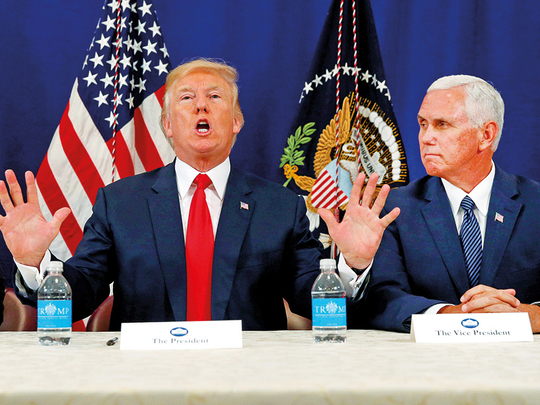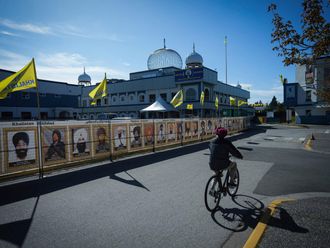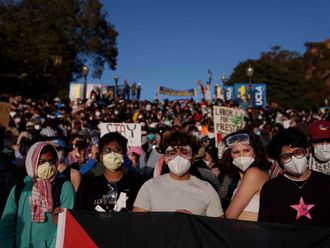
WASHINGTON: President Trump reinforced his threat to unleash “fire and fury” on North Korea despite widespread criticism of his bellicosity, saying Thursday that his initial statement maybe “wasn’t tough enough.”
The strong language — Trump used versions of the word “tough” four times during one seven-minute exchange with reporters, while downplaying the potential for negotiations and sanctions — came only hours after Secretary of Defense James N Mattis stressed the importance of diplomacy in the increasingly tense standoff with the nuclear-armed state.
“Of course there’s a military solution,” Mattis told reporters en route to a visit to a nuclear submarine base in Seattle, which he said was long-planned. “But what we’re trying to do here is leave it loud and clear... in the diplomatic arena: It is North Korea’s choice. Do you want a much better future — the entire world community is saying one thing — or do you want a much worse future?”
Trump, however, expressed little hope that negotiations could defuse tensions or put an end to North Korea’s programme to develop nuclear-armed intercontinental ballistic missiles capable of striking the United States or its allies.
“Sure, we’ll always consider negotiations. But they’ve been negotiating now for 25 years,” he said, addressing reporters from his golf club in Bedminster, NJ, with Vice President Mike Pence beside him.
The statement came in one of two impromptu news conferences Trump held, for just under 30 minutes combined, before and after a security briefing from top advisers. The president is on what the White House is calling a working vacation, a 17-day stay mainly at his club that so far has included long periods out of public view punctuated by a few meetings, provocative tweets and official statements.
Divergent messages from Trump and his top advisers are not uncommon. But they have been a hallmark of his administration’s response to North Korea since Tuesday, when the Washington Post reported on US intelligence assessments that the adversarial nation had produced a miniaturised nuclear warhead compatible with its missiles.
Trump’s initial Tuesday comments, an off-the-cuff warning that threats from North Korean leader Kim Jong Un would be met with “fire and fury like the world has never seen,” prompted Kim to threaten a missile attack on Guam, the island territory of the United States in the Pacific that is home to a huge American military base.
Trump accused his White House predecessors of timidity, of letting Kim get away with such threats without blowback. “It’s about time that somebody stuck up for the people of this country and for the people of other countries,” he said.
“Let’s see what he does with Guam,” Trump said of Kim later, during his second round with reporters. “If he does something in Guam, it will be an event the likes of which nobody’s seen before.”
“It’s not a dare,” the president added. “It’s a statement.”
North Korea on Thursday provided unusual detail about its threat to Guam, saying a plan would be ready for Kim’s approval by mid-August.
The state-run Korean Central News Agency reported on a statement that the government in Pyongyang is “seriously examining the plan for an enveloping strike at Guam through simultaneous fire of four Hwasong-12 intermediate-range strategic ballistic rockets in order to interdict the enemy forces on major military bases on Guam and to signal a crucial warning to the US.”
The statement quoted a North Korean general, Kim Rak Gyom, as saying of Trump, “Sound dialogue is not possible with such a guy bereft of reason and only absolute force can work on him.”
The general dismissed Trump’s threat of “fire and fury” as a “load of nonsense.”
Trump seemed to be betting that strong words lodged against Pyongyang would go further than the diplomatic actions undertaken by his administration, going so far as to express uncertainty in them to reporters. He also contradicted himself, alternately dismissing and promoting the possibility of influencing Kim’s behaviour with a new set of sanctions that was approved unanimously last week in the United Nations Security Council.
“Probably, it will not be as effective as a lot of people think it can be,” he said in his first exchange with reporters.
“Big impact,” he declared about an hour later.
The president’s belligerent language, in matching rhetoric used by Kim, has heightened anxiety and fear among Americans and allies about a nuclear confrontation with a volatile adversary. Trump again declined to rule out a first strike, reiterating his policy of refusing to discuss future military plans.
At another point, he used vague and sharp language to demand that North Korea “get their act together,” or “they’re going to be in trouble like few nations ever have been in trouble in this world.”
Asked to provide reassurance to Americans concerned by the heated words between the two countries, Trump pointed to the strength of the military. He again spoke of the nuclear threat, not climate change, as the greatest one the world faces, and said he would be announcing a plan next week to add billions of dollars to the nation’s missile defence.












